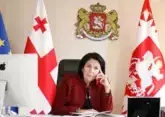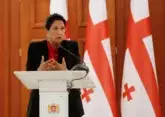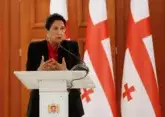On Tuesday or Wednesday, the leaders of the ruling party ‘Georgian Dream’ (GD) will gather for a meeting to solve the issue of concern for all politicians and experts in the country: whether Bidzina Ivanishvili's party nominates its own presidential candidate or supports ‘an independent’, non-partisan candidate, former Ambassador of France to Tbilisi Salome Zourabishvili.
A few days ago, a high probability of Zurabishvili's support was openly spoken by all the status persons of the GM party. Such a position was dictated by the leader of the party - Bidzina Ivanishvili himself was the initiator of the refusal to nominate a party candidate for the post of head of state and hinted (though not directly) that Zurabishvili's candidacy was acceptable for him.
Just one day after Ivanishvili's statement, the former French ambassador to Tbilisi, who previously headed the Georgian Foreign Ministry, began the consultations with the official Paris on the rejection of the second, French citizenship, as Georgian legislation prohibits persons with dual citizenship from holding the highest office.
It seemed to be not the major problem, since Salome Zurabishvili, being a descendant of Georgian emigrants of the first wave and aristocrat by origin, enjoys great popularity in the society. She is considered an impersonation of Georgia’s European orientation. Her chances were further enhanced by the open support of the billionaire and his party.
But then, an incident took place, which, if not overturned the unspoken agreement with the GM, made its implementation much more problematic. On August 6, on the eve of the anniversary of the Five-day war, Zurabishvili unequivocally stated that Georgia started the war in South Ossetia ten years ago. Further, despite the violent attack from the media close to President Saakashvili, she not only did not refused her own words but repeated this thesis several times during the past few days, laying the blame on the ex-president.
Prime Minister Mamuka Bakhtadze, answering journalists' questions on the subject, clearly tried to avoid the ‘sharp edges’. He did not directly support Zurabishvili, but he ventured into the vague arguments that on the eve of that fateful August, Western friends of Georgia warned Mikheil Saakashvili ‘not to succumb to provocations’, but he ‘could not avoid being drawn into the gamble’.
Whether all these verbal exercices are the improvisation of the scandal's figurants, or the home preparation and a positive signal to Moscow, we will yet to see, when the Georgian Dream will make a final decision on the presidential election.
In the same speech, Bakhtadze, as usual, urged Moscow to implement the agreement of the Presidents of France and Georgia on August 12, 2008 on the complete withdrawal of troops. At the same time, the Georgian authorities do not want to spoil relations with Russia, when the Russian market and tourists help to keep the economy and national currency of the country afloat.










